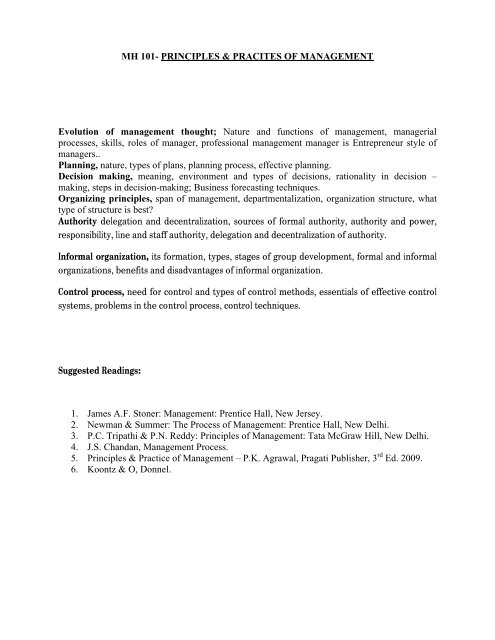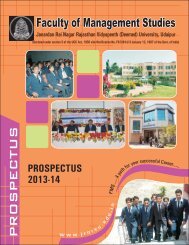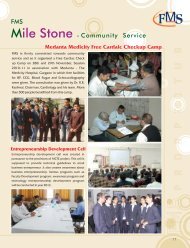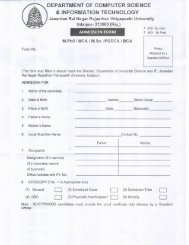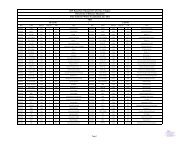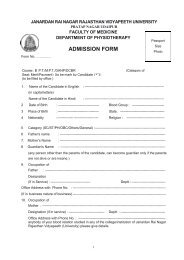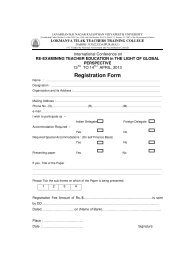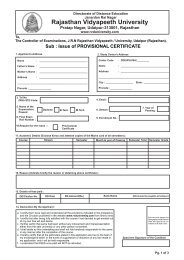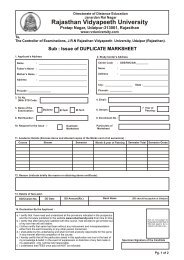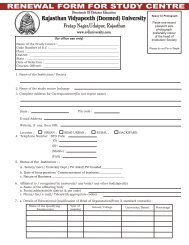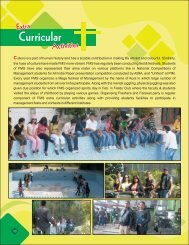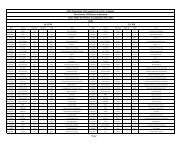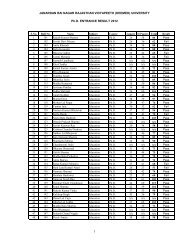MH 101- PRINCIPLES & PRACITES OF MANAGEMENT Evolution of ...
MH 101- PRINCIPLES & PRACITES OF MANAGEMENT Evolution of ...
MH 101- PRINCIPLES & PRACITES OF MANAGEMENT Evolution of ...
Create successful ePaper yourself
Turn your PDF publications into a flip-book with our unique Google optimized e-Paper software.
<strong>MH</strong> <strong>101</strong>- <strong>PRINCIPLES</strong> & <strong>PRACITES</strong> <strong>OF</strong> <strong>MANAGEMENT</strong><br />
<strong>Evolution</strong> <strong>of</strong> management thought; Nature and functions <strong>of</strong> management, managerial<br />
processes, skills, roles <strong>of</strong> manager, pr<strong>of</strong>essional management manager is Entrepreneur style <strong>of</strong><br />
managers..<br />
Planning, nature, types <strong>of</strong> plans, planning process, effective planning.<br />
Decision making, meaning, environment and types <strong>of</strong> decisions, rationality in decision –<br />
making, steps in decision-making; Business forecasting techniques.<br />
Organizing principles, span <strong>of</strong> management, departmentalization, organization structure, what<br />
type <strong>of</strong> structure is best?<br />
Authority delegation and decentralization, sources <strong>of</strong> formal authority, authority and power,<br />
responsibility, line and staff authority, delegation and decentralization <strong>of</strong> authority.<br />
Informal organization, its formation, types, stages <strong>of</strong> group development, formal and informal<br />
organizations, benefits and disadvantages <strong>of</strong> informal organization.<br />
Control process, need for control and types <strong>of</strong> control methods, essentials <strong>of</strong> effective control<br />
systems, problems in the control process, control techniques.<br />
Suggested Readings:<br />
1. James A.F. Stoner: Management: Prentice Hall, New Jersey.<br />
2. Newman & Summer: The Process <strong>of</strong> Management: Prentice Hall, New Delhi.<br />
3. P.C. Tripathi & P.N. Reddy: Principles <strong>of</strong> Management: Tata McGraw Hill, New Delhi.<br />
4. J.S. Chandan, Management Process.<br />
5. Principles & Practice <strong>of</strong> Management – P.K. Agrawal, Pragati Publisher, 3 rd Ed. 2009.<br />
6. Koontz & O, Donnel.
<strong>MH</strong> 102 – QUANTITATIVE METHODS<br />
Measures <strong>of</strong> Central Tendency: Mean, Median, Mode<br />
Measures <strong>of</strong> dispersion: Range, Mean deviation, Standard deviation, Quartile deviation.<br />
Measures <strong>of</strong> skewness; Moments and kurtosis.<br />
Correlation and Linear Regression<br />
Index Numbers; Time series: Its components and their determination.<br />
Probability: Definition, Additive and multiplicative rules, conditional probability, Probability<br />
Distribution: Normal, Binomial and Poisson.<br />
Suggested Readings:<br />
1. S.P. Gupta: Statical method ; Sultan Chand & Sons.<br />
2. S.C. Gupta: Fundamentals <strong>of</strong> Statistics.<br />
3. N.B. Agrawal : Advanced Business Statistics.<br />
4. Richard l Levis: Statistics for Management; Prentice Hall <strong>of</strong> India.<br />
5. Statistics for Management by Richard I Levin, Prentice Hall <strong>of</strong> India Pvt. Ltd.
<strong>MH</strong> 103 – BUSINESS COMMUNICATION<br />
Avoiding Substandard Writing – Errors in the use <strong>of</strong> nouns, pronouns, adjectives, adverbs,<br />
prepositions, conjunctions, articles. Errors in sentence construction.<br />
Tips for clear writing- Tips regarding choice <strong>of</strong> words, tips for sentence construction, Tips for<br />
Paragraph Design.<br />
Reading – Purpose, Comprehension <strong>of</strong> an Unseen Passage, Tactics and Strategies for a good<br />
reading.<br />
Precis Writing<br />
Business Communication – its meaning, objectives, importance <strong>of</strong> communication in Business<br />
and industry. Various types <strong>of</strong> communication. Essentials <strong>of</strong> good communication.<br />
Communication Process- Basic Elements in the communication process, Factors Influencing<br />
communications, Channels <strong>of</strong> communications, Seven Cs <strong>of</strong> Effective communications.<br />
Business Correspondence – Planning the Business Letter, Letters <strong>of</strong> Enquiry, order, Complaint<br />
and follow-up, Collection letters, Circulars, Job applications.<br />
Writing Business Reports – Technique <strong>of</strong> Writing a Report, The letter-style Report, Schematic<br />
Report, Writing a Market Survey Report.<br />
Suggested Readings:<br />
1. Rajendra Pal and J.S. Korlahalli: Essentials <strong>of</strong> Business Communications.<br />
2. U.S. Rai and S.M. Rai: Business Communications<br />
3. Menzal and D.H. Jones: Writing Technical Paper, McGraw Hill.<br />
4. Agrawal & Agrawal, Business Communication: Strategy and Skill, Prentice Hall.
<strong>MH</strong> 104 – HRM FUNCTIONS<br />
Introduction: Definition, Functions and Objectives <strong>of</strong> Human Resource Management, Role <strong>of</strong> Human<br />
Relations in HRM, Qualities <strong>of</strong> a Good Human Resource Manger, <strong>Evolution</strong> and Growth <strong>of</strong> HRM in India,<br />
Future <strong>of</strong> HRM in India, Human Resource Philosophy and Policies, The Indian Perspective.<br />
Procurement <strong>of</strong> Personnel: Corporate Objectives & Human Resource Planning, Determination<br />
<strong>of</strong> the Kind or Quality <strong>of</strong> Personnel, Determination <strong>of</strong> Quantity <strong>of</strong> Personnel <strong>of</strong> Manpower<br />
Planning Process, Recruitment and Selection, Selection Techniques and Factors Determining<br />
their Functional Value, Career & Succession Planning.<br />
Performance Appraisal: Purpose <strong>of</strong> Appraisal, Factors affecting Performance Appraisal, Criteria<br />
<strong>of</strong> Performance Appraisal, Performance Appraisal Methods and their Limitations, Post Appraisal<br />
Interview and Performance management.<br />
Training and Development: Training, Education and Development, Principles <strong>of</strong> Learning, Need<br />
& Objectives <strong>of</strong> Training, Determining Training Needs, Training Methods for Operatives and<br />
Managers.<br />
Employee Compensation: Nominal and Real Wages, How are Wages Determined? Internal<br />
Equity and External Competitiveness, Incentive Compensation, Requisites, Advantages and ill<br />
effects.<br />
Employee Grievance and Discipline: Causes <strong>of</strong> Grievances, How to know about Grievances?<br />
Desirable Features <strong>of</strong> a grievance redressal procedure, Causes <strong>of</strong> Indiscipline, Arguments for<br />
and against Punishment, Essentials <strong>of</strong> a Good Disciplinary System (Hot Stove Rule).<br />
Employee Empowerment: Worker Participation in Management, Factors Influencing<br />
Participation, Worker’s Participation in Management in India, Some Issues for Consideration.<br />
Suggested Readings:<br />
1. P.C. Tripathi: Personnel Management and Industrial Relations: (12 th Edition): Sultan<br />
Chand & Sons, New Delhi.<br />
2. Aswathappa K. Human Resource and Personnel Management, Tata McGraw Hill, New<br />
Delhi.<br />
3. Edwin Flippo: Principles <strong>of</strong> Personnel Management: McGraw Hill: New York.<br />
4. Dale Yoder: Personnel Management and Industrial Relations: Prentice Hall, Delhi.<br />
5. Arun Monappa and Saiyadain: Personnel Management, Tata McGraw Hill, Delhi.<br />
6. P. Subba Rao : Himalaya Publishing House, 3 rd Ed., 2008.<br />
7. Mathis & Jackson.
<strong>MH</strong> – 105: FUNCTIONAL AREAS <strong>OF</strong> <strong>MANAGEMENT</strong><br />
Definition; <strong>Evolution</strong> <strong>of</strong> Marketing Philosophies; Marketing Environment; Product vs Service<br />
Marketing; Social Marketing; Domestic vs International Marketing; Four Ps <strong>of</strong> Marketing;<br />
Product, Price, Place and Promotion; Consumer Behaviour : Models, Characteristics affecting<br />
Consumer Behaviour; Buyer Decision Process.<br />
Segmentation; Positioning; Building Customer Relationships through Satisfaction, Value and<br />
Quality; Creating Competitive Advantage through Competitor Analysis and Competitive<br />
Marketing Strategies; Marketing Organisation.<br />
System Concept in Production Management, Types <strong>of</strong> Production Systems, Operation<br />
Decisions, Objectives in Production Management, Basic Ideas <strong>of</strong> Job Design & Work Design.<br />
Quality, Economics <strong>of</strong> Quality, Acceptance Sampling, Basic Idea <strong>of</strong> Statistical Qualit<br />
Control (SQC).<br />
Basics <strong>of</strong> Financial Management: Finance Functions, Objective <strong>of</strong> Financial Management,<br />
Overview <strong>of</strong> Long term and Short term Sources <strong>of</strong> Finance, Cost Volume Pr<strong>of</strong>it Analysis. Risks in<br />
Financial Management.<br />
Financial Decision Making : Capital Budgeting Techniques, Capital Structure:<br />
Features and Determinants, Working Capital Financing: Concept and Approaches,<br />
Determinants <strong>of</strong> Working Capital, Dividend Decisions, Factors Affecting Dividend<br />
Policy.<br />
Suggested Readings<br />
1. Marketing Management : P.K. Srivastava<br />
2. Financial Management : I.M. Pandey<br />
3. Production Management : Buffa
<strong>MH</strong> 106 – COMPUTER APPLICATIONS IN <strong>MANAGEMENT</strong><br />
Computers – An Introduction – Computers in Business; Elements <strong>of</strong> Computer System Set-up;<br />
Indian Computing Environment; Components <strong>of</strong> a Computer System;<br />
Generations <strong>of</strong> Computers and Computer Languages, Personal Computers in Business.<br />
PC-S<strong>of</strong>tware Packages – An Introduction – Disk Operating System and Windows.<br />
Text Processing S<strong>of</strong>tware, Introduction to a spreadsheet s<strong>of</strong>tware; Creation <strong>of</strong> spreadsheet<br />
applications; Range, Formulas, Functions, Data Base Functions In spreadsheet; Graphics on<br />
Spreadsheet.<br />
Modes <strong>of</strong> Data Processing – Computer S<strong>of</strong>tware Systems; S<strong>of</strong>tware Development Process; File<br />
Design and Report design; Data Files – Types/ Organizations; Master & Transaction File;<br />
Relevance <strong>of</strong> Data Base Management Systems and Integration <strong>of</strong> Applications; Basics <strong>of</strong> Data<br />
Processing.<br />
Flow Charting; Input – Process-Output Analysis; Programming Concepts; Use <strong>of</strong> Files in<br />
Programming. Data Communication, Basic concepts <strong>of</strong> Networking.<br />
Suggested Readings:<br />
1. Burch, John and Grudnitski Gary: Information Systems: Theory and Practice, 5 th ed.,<br />
New York, Jonn Wiley, 1989.<br />
2. David, Van Over: Fundamental <strong>of</strong> Business Systems, Fort Worth, Dryden, 1992.<br />
3. Eliason, A.L.: On-line Business Computer Applications, 2 nd ed., Chicago, Science<br />
Research Associates, 1987.<br />
4. Estrada, Susan: Connecting to the Internet, Sebastopol, C A, O’Reilly, 1993.<br />
5. John, Moss Jones: Automating Managers: the Implications <strong>of</strong> Information Technology<br />
for Managers, London, Pinter, 1990.<br />
6. Long L.: Computers, Englewood Cliffs, New Jersey, Prentice Hall Inc., 1986.<br />
7. Summer, M.: Computers Concepts and Uses, 2 nd ed., Englewood Cliffs, New Jersey,<br />
Prentice Hall Inc., 1988.
<strong>MH</strong> 201 - HUMAN RESOURCE DEVELOPMENT<br />
Human Resource Development: Definition; Objectives; Functions; Scope (elements); HRD<br />
Mechanisms or subsystems; Functions & Attributes <strong>of</strong> an HRD Manager.<br />
Job Design and Job Analysis:<br />
Job Design: approaches; Job Rotation, Job Enlargement, Job Enrichment, Teamwork.<br />
Job Analysis: Need, Team analysis, Process, Recent developments.<br />
Job Description: Characteristics, contents, steps<br />
Job Specification – Information.<br />
Career Planning and Development:<br />
Career Planning – Meaning; objectives; process; Requirements for effective career planning;<br />
career counseling.<br />
Career Development- Meaning; Elements; Process ; Career stages.<br />
Quality Issues in HRM: The concept <strong>of</strong> Total Quality Management; The ISO 9000 Family;<br />
Quality Circles- Structure & Functioning; The Concept <strong>of</strong> Quality <strong>of</strong> Work Life (Q.W.L.), work<br />
life balance.<br />
HRM: A Futuristic Overview: Role <strong>of</strong> Top Management in promotion <strong>of</strong> HRD; 21 st century:<br />
changing perspectives & challenges, cross cultural differences & managing implications.<br />
Suggested Readings:<br />
1. Kumar N & R Mittal (2001): Personnel Management and Industrial Relations’, Anmol<br />
Publications Pvt. Ltd., New Delhi.<br />
2. Kapur Shashi (1999): ‘The Practicing Manager’s’ Handbook’, Infinity Books, New<br />
Delhi.<br />
3. Rao, P. Subba(2002):’Personnel and Human Resource Management’, Himalya<br />
Publishing House, Mumbai.<br />
4. V.S. P. Rao: Human Resource Management.<br />
5. C.B. Gupta: Human Resource Management (Sultan Chand & Sons).<br />
6. T.N. Chabbra: Human Resource Management (Dhanpat Rai & Sons).<br />
7. Tripathi, P.C. (2006), Human Resource Development, Sultan Chand & Sons.<br />
8. L.M. Prasad : Human Resource Management; Sultan Chand & Sons.
<strong>MH</strong> 202 - ORGANISATIONAL BEHAVIOUR<br />
Organisations: Meaning and Typology.<br />
Organisational Behaviour: Macro and Micro perspectives, as discipline. key elements, scope.<br />
Individual Behaviour: Personality, Perception, Values, Attitude.<br />
Group Behaviour: Meaning <strong>of</strong> Group Dynamics, Types <strong>of</strong> Groups, Formation and Development<br />
<strong>of</strong> Groups, Group Cohesiveness and Effectiveness, Diagnosis <strong>of</strong> Group Behaviour, Techniques<br />
for studying Group Behaviour (Sociometric Questioning and Robert Bale’s Interaction Process<br />
Analysis), Communication in group.<br />
Leadership: Definition and Need for Leadership, Approaches to studying Leadership: Traits,<br />
Behavioural and Contingency Approaches, Effective Leadership.<br />
Motivation, Job Satisfaction and Morale: Definition and Characteristics <strong>of</strong> Motivation,<br />
Motivation Theories <strong>of</strong> Maslow, Herzberg, McClelland, Vroom and Skinner Determinants <strong>of</strong> Job<br />
Satisfaction and Morale, Relationship <strong>of</strong> Incentives, Job Satisfaction and Morale with<br />
Productivity.<br />
Competition and Conflict: levels/ types <strong>of</strong> conflict, stages <strong>of</strong> Conflict, Causes and Consequences<br />
<strong>of</strong> intergroup conflict, management <strong>of</strong> conflict.<br />
Organisational Culture and Climate: Meaning, Dimensions <strong>of</strong> Organisational climate, factors<br />
effecting organisational climate, measurement <strong>of</strong> organisational climate, meaning and<br />
components <strong>of</strong> culture.<br />
Organisational Change and Effectiveness: Need for change, Change process, Dimensions <strong>of</strong><br />
change, Resistance to change, Management <strong>of</strong> change. Effectiveness – meaning and<br />
dimensions, measurement: single and multiple criteria measures.<br />
Suggested Readings:<br />
1. Hersey and Blanchard: Management <strong>of</strong> Organisational Behaviour, Prentice Hall, New Delhi.<br />
2. J.S. Chandan: Organisational Behaviour, Vikas, New Delhi.<br />
3. B.P. Singh & T.N. Chabbra: Organisational Behaviour.<br />
4. Robbins: Organisational Behaviour.<br />
5. L.M. Prasad : Organisational Behaviour; Sultan Chand & Sons.<br />
6. Suri & Chopra : Organisational Behaviour.
<strong>MH</strong> 203 – RESEARCH METHODOLOGY<br />
Introduction: Meaning & Objectives <strong>of</strong> Research, Types <strong>of</strong> Research, Research Approaches,<br />
Research Process, Problems in Research, Organisation Structure <strong>of</strong> Research.<br />
Problem Formulation and Statement <strong>of</strong> Research Objectives, Techniques <strong>of</strong> Defining a problem.<br />
Research Design: Meaning & Features <strong>of</strong> a Good Research Design, Important Concepts,<br />
Different Research Designs, Basic Principles <strong>of</strong> Research Design.<br />
Sampling Design: Implications <strong>of</strong> Sample Design, Steps in Sample Design and Criteria for<br />
Selecting a Sampling Procedure, Types <strong>of</strong> Sample Design.<br />
Measurement & Scaling Techniques: Measurement Scales, Errors in Measurement, Tests <strong>of</strong><br />
Sound Measurement, Scaling, Important Scaling Techniques, Scale Construction Techniques.<br />
Data Collection & Analysis: Methods <strong>of</strong> Data Collection – Primary & Secondary,<br />
Questionnaire Construction, Field Work & Tabulation <strong>of</strong> Data, Data Processing Operations,<br />
Statistical Techniques for Data Analysis.<br />
Statistical Inference: Parameter estimation, Hypothesis Testing <strong>of</strong> mean only in large and small<br />
samples.<br />
Elementary knowledge <strong>of</strong> non-parametric tests.<br />
Interpretation & Report Writing: Technique <strong>of</strong> Interpretation, Different Steps in Writing a<br />
Report, Layout <strong>of</strong> the Research Report, Precautions for Writing Research Report.<br />
Suggested Readings:<br />
1. C.R. Kothari: Research Methodology: Methods and Techniques.<br />
2. P.C. Tripathi: Research Methodology in Social Sciences.<br />
3. Subbi Reddy & Bappa Rao: Research Methodology and Statistical Measures.<br />
1. P.K. Srivastava: Marketing Research (Hindi), 3 rd Ed., 2000 Rajasthan Hindi Grant<br />
Academy, Jaipur.<br />
2. V.P. Michael : Research Methodology.<br />
3. Donald cuper & Pamela Sehilder : Business Research Methods.<br />
4. Wilkinson & Bhandarkar : Methodology & Techniques <strong>of</strong> Social Research.
<strong>MH</strong> 204 - BUSINESS ENVIRONMENT<br />
Theoretical Framework: Concept, significance and nature <strong>of</strong> business environment; Elements<br />
<strong>of</strong> environment- internal and external; Changing dimensions <strong>of</strong> business environment;<br />
Techniques <strong>of</strong> environmental scanning and monitoring.<br />
Economic Environment: Significance and elements <strong>of</strong> economic environment; economic<br />
systems and business environment: economic planning in India: government policies- industrial<br />
policy, fiscal policy, monetary policy, EXIM policy; public sector and economic development;<br />
economic reforms, liberalization and structural adjustment programmes.<br />
Political and Legal Environment: Critical elements <strong>of</strong> political environment; government and<br />
business; changing dimensions <strong>of</strong> legal environment in India; MRTP Act, FEMA and licensing<br />
policy; Consumer protection act.<br />
Socio Cultural Environment: Critical elements <strong>of</strong> socio-cultural environment; social<br />
institutions and systems; social values and attitudes; social groups; emerging rural sector in<br />
India; Indian business system; Social responsibility <strong>of</strong> business; consumerism in India.<br />
International and Technological Environment: Multinational Corporations; Foreign<br />
collaborations and Indian business; International economic institutions: WTO, World Bank, IMF<br />
and their importance to India; foreign trade policies; technological environment in India; policy<br />
on research and development; patent laws; technology transfer.<br />
Suggested Readings:<br />
1. Busines Environment by F.Cherunillam, Himalya Publishing House,<br />
2. C.M. Chaudhary: Business Environment<br />
3. M.Adnikar : Economic Environment <strong>of</strong> Business.<br />
4. R. Agrawal : Business Environment ; Excel Books<br />
5. S.K. Bedi : Business Environment; Excel Books.
<strong>MH</strong>205 - BUSINESS POLICY AND STRATEGIC ANALYSIS<br />
Business Policy and Corporate Strategy: Approach to central management problems, Concept<br />
<strong>of</strong> strategy, strategic management, Defining Company Policy relating to marketing, production,<br />
finance and human resource areas.<br />
Strategic Management Process: Nature and purpose, Different phases, Statement <strong>of</strong> mission<br />
and objectives – their formulation, Mintzberg six power configurations.<br />
Environmental Analysis and Diagnosis: Environmental factors, Techniques <strong>of</strong> environmental<br />
analysis and diagnosis, preparing E.T.O.P. and S.A.P., SWOT analysis, Competitive Analysis:<br />
Theoritical viewpoints, Porter’s framework for analyzing competition, Generic competitive<br />
strategies, Routes to Competitive Advantages.<br />
Strategic Choice: Generating alternative strategies, mergers and acquisitions, tools for selection<br />
decision, BCG Matrix, H<strong>of</strong>er’s Work, SPACE, GEC Model.<br />
Managerial factors <strong>of</strong> strategic analysis.<br />
Implementation and Evaluation <strong>of</strong> Strategy: Implementation <strong>of</strong> strategy, Mckinsey 7-s<br />
framework, resource allocation, Organizational structure, Management policy and administration<br />
Styles.<br />
Evaluation <strong>of</strong> strategy.<br />
Suggested Readings:<br />
1. Azhar Kazmi: Business Policy.<br />
2. U.I. Khan: Business Policy.<br />
3. William F. Glueek: Business Policy and Strategic Management, McGraw.<br />
4. Ans<strong>of</strong>f J.I.: Corporate Strategy, McGraw.<br />
5. Mc Carthy et al: Business Policy and Strategy, Irwin.
<strong>MH</strong> 206 - DSS AND <strong>MANAGEMENT</strong> INFORMATION SYSTEM<br />
Management Information System: Definitions – Basic Concepts, Frameworks – Major Trends<br />
in Technology, applications <strong>of</strong> Information Technology.<br />
System & Design: Systems Development, initiative, Different Methodologies – Life Cycle &<br />
Prototype approach detailed study on Life Cycle Designing & Implementation, CASE Study.<br />
Managerial Decision making: process, problem solving techniques, how decisions are being<br />
supported, Simon’s model – decision styles, group decision making, features <strong>of</strong> various CBIS.<br />
Decision Support System An Overview: Relevance scope <strong>of</strong> DSS, characteristics and<br />
capabilities <strong>of</strong> DSS, components <strong>of</strong> DSS, classification <strong>of</strong> DSS, DSS Tools- DSS generators –<br />
specific DSS. Constructing a DSS, Steps in designing a DSS.<br />
Database Management System: Sources <strong>of</strong> data file environment & database environment, data<br />
models, relevance <strong>of</strong> relational data base, data base design in DSS.<br />
HRIS: Organising Data, Personnel audit, Personnel research, Computer application in HRM.<br />
Uses <strong>of</strong> HRIS in HRD with special reference to performance appraisal, training need,<br />
Identification and career planning.<br />
Suggested Readings:<br />
1. Krober, Donald W., and Hugh J. Watson Computer Based Information System, Newyork,<br />
1984.<br />
2. Davis L., Michael W. A Management approach – Macmillan Publishing Company,<br />
Prentice Hall, New Jersey, 1988.<br />
3. Andrew P. Decision Support System Engineering, Sage, John Wiley & Sons, New York,<br />
1991.<br />
4. Management Information System. D.P. Goyal.<br />
5. Management Information System – A.K. Gupta<br />
6. Management Information System - Launden & Launden
<strong>MH</strong> 301 – INDUSTRIAL RELATIONS<br />
Industrial Relations in India: Concept <strong>of</strong> IR, Emerging Trends in IR in new economic<br />
scenario.<br />
Industrial Disputes: Causes, Industrial Disputes Act, 1947, Industrial Relations Scene: An<br />
overview.<br />
Collective Bargaining: Concept, Philosophy, Rationale and Process, Emerging trends in<br />
collective bargaining in India.<br />
Industrial Democracy: Concept and Scope, Forms <strong>of</strong> Industrial democracy, Worker’s<br />
participation in management in India, Experiences <strong>of</strong> UK, Yugoslavia, West Germany,<br />
Scadinavian countries and Japan in the realm <strong>of</strong> industrial democracy.<br />
Trade Unions: Theories <strong>of</strong> Trade Unionism: Trade unionism in a developing economy, History<br />
<strong>of</strong> Trade Unionism in India. Present Position: Structure, Leadership (political influence and<br />
dominance), Recognition, Multiunionism, Worker’s education, National Federations <strong>of</strong> Trade<br />
Unions, Trade Union Act, 1926.<br />
Suggested Readings:<br />
1. Baldev R. Sharma: The Indian Industrial Worker, Vikas Publishing House, 1974.<br />
2. R.B. Agrawal: Dynamics <strong>of</strong> Labour Relations in India, Book <strong>of</strong> Reading, Tata McGraw<br />
Hill, 1972.<br />
3. Van D Kennedy: Unions, Employers and Government, Manakatalas, Bombay, 1966.<br />
4. Charles A Myers and Rannapan: Industrial Relations in India, Asia Publishing House,<br />
New Delhi.<br />
5. C.K. Johri: Unions in a Developing Economy, Asia Publishing House, 1967.<br />
6. Kudchedkar: Aspects <strong>of</strong> Personnel Management and Industrial Relations in India, Tata<br />
McGraw Hill Publishing Company, New Delhi.<br />
7. Pramod Verma: Management <strong>of</strong> Industrial Relations, Oxford & IBH.<br />
8. A.M.S. Varma: Industrial Relations, Himalaya, Bombay.<br />
9. Bare Acts
<strong>MH</strong> 302 – LABOUR LEGISLATION<br />
Introduction: Definition <strong>of</strong> Labour Law, Principles and objectives, Labour and Indian<br />
Constitution, Sources <strong>of</strong> Labour Law, Labour Laws and present scenario.<br />
The Factories Act, 1948 and The Contract Labuour (Regulation and Abolition) Act, 1970.<br />
The Industrial Employment (standing orders) Act, 1946 and The Rajasthan Shops and<br />
Commercial Establishment Act, 1958.<br />
The Apprentices Act, 1961 and the Compulsory Notification (Employment Exchange) Act, 1959.<br />
The Equal Remuneration Act, 1976. Discipline, disciplinary action and domestic enquiry.<br />
References:<br />
1. Industrial Law by P.L. Malik.<br />
2. Labour Legislation by N.D. Kapur.
<strong>MH</strong>- 303 : INDUSTRIAL PSYCHOLOGY<br />
Importance <strong>of</strong> Industrial Psychology: Nature, Scope & Problems <strong>of</strong> Industrial Psychology.<br />
Foundations <strong>of</strong> Industrial Psychology: Economics, Social & Psychological.<br />
Psychological Test: Concept, importance <strong>of</strong> Psychological test in Industrial areas, different types<br />
<strong>of</strong> psychological tests.<br />
Fatigue, Boredom, Monotony. Industrial accidents and safety.<br />
Working conditions: Noise, Atmosphere, Work schedule shift and rest pauses.<br />
Methods <strong>of</strong> Work & Design <strong>of</strong> Equipment: Time and Motion Economy, Effective arrangement <strong>of</strong><br />
Work Place. Psychological factors <strong>of</strong> effective designs <strong>of</strong> tools.<br />
Suggested Readings :<br />
1. Dunnettee Morvin : Handbook <strong>of</strong> Industrial Psychology and Organisational Behaviour.<br />
2. Ernest J. McCormic & Darniel Hegn: Industrial Psychology, George Allen & Urwin, London.<br />
3. Industrial Psychology, Bhatnager J.B<br />
4. Industrial prychology : S.P. Chaube<br />
5. Industrial Psychology : Sharma and Chandr<br />
(Pub. Atlantic, New Delhi)<br />
6. Ghosh : Industrial Psychology
<strong>MH</strong>- 304 : TRAINING & DEVELOPMENT<br />
Conceptual Framework : Training, Development, Difference between Training &<br />
Development, objectives & importance <strong>of</strong> Training, Training and Development in<br />
India.<br />
Learning : Meaning, principles, factors affecting learning process.<br />
Training process: Determining Training objectives, assessment <strong>of</strong> training needs,<br />
modern training technology, systematic planning <strong>of</strong> the training.<br />
Methods & Techniques, selection <strong>of</strong> right method, communication in training, training aids,<br />
development <strong>of</strong> training modules, Training strategies.<br />
Effectiveness & evaluation <strong>of</strong> training: importance, techniques etc. Training <strong>of</strong> the<br />
trainers. Preventing employee obsolescence through training rate <strong>of</strong> outside consultants. It<br />
based training, computer based training & web based training.<br />
Suggested Readings :<br />
1.Training for Development Rolf P.lyton and Udai Pareek Publisher : Vistaar, New Delhi.<br />
2. A Handbook <strong>of</strong> Training Management Kenneth R. Robinson Publisher : Aditya Book Pvt.<br />
Ltd.,New Delhi<br />
3.The Training Manager’s – A Handbook Eddie Davies Publisher : Crest Publishing House, New<br />
Delhi<br />
4.Training and Development Vasu Deva Publisher : Commonwealth Publishers, New Delhi<br />
5.HRD Through In-House Training P.L. Rao Publisher : ISTD, Vikas Publishing House, New Delhi<br />
S.K. Bhata, Training for Development.
<strong>MH</strong>-305 : COMPENSATION & LABOUR WELFARE<br />
Corporate Considerations in Compensation Management : Working <strong>of</strong> different institutions<br />
like Wage Boards and Pay Commissions in India.<br />
Components <strong>of</strong> Wage and Salary Package in India: Leading issues pertaining to wage<br />
& salary administration and recent trends in Wage Policy in India.<br />
Fundamental aspects <strong>of</strong>: Payment <strong>of</strong> Wages Act 1936, Minimum Wages Act 1948<br />
and Payment <strong>of</strong> Bonus Act1965.<br />
Principles <strong>of</strong> labour Welfare, Types <strong>of</strong> welfare services in India: Safety, Health,<br />
Counselling, Education. Machinery connected with welfare work. Appraisal <strong>of</strong><br />
welfare services.<br />
Meaning <strong>of</strong> Social Security. Social Security in India. A critical appraisal <strong>of</strong> social<br />
security in India. Objectives, Functions and Role <strong>of</strong> ILO.<br />
Fundamental aspects <strong>of</strong>: Safety Provisions under Factories Act 1948, Employees<br />
Compensation Act 1923, ESI Act 1948, Payment <strong>of</strong> Gratuity Act 1972 and Maternity<br />
Benefit Act 1961.<br />
Suggested Readings :<br />
1. Principles <strong>of</strong> Wage Determination : T.S.Papola, Somaiya Publication, Mumbai.<br />
2. Wage Issue in a Developing Economy : An Indian Experience : F.A.J. Foneeca,<br />
Oxford University Press, Delhi.<br />
3. Income Policy and Industrial Relations : C.K.Johri, Shri Ram Centre for Industrial<br />
Relations, Delhi.<br />
4. Wage in India : K.N. Subramanian, Tata McGraw Hill Publishing Co.,Delhi.<br />
5. Incentive Payment System : R. Marriott, Staples Press, London.<br />
6. New Concept in Wage Determination : Georcew, Taylor and John T Dunlop.<br />
7. Wage Incentives : Theory & Practice : G.K. Suri, Shri Ram Centre for Industrial<br />
Relation, New Delhi.<br />
8. Executive Compensation : K.K. Anand, Madras Management Association.<br />
9. Report <strong>of</strong> Committee on Wages, Income and Prices Policy 1978.<br />
10. Bare Acts.<br />
11. Aspects <strong>of</strong> Labour Welfare and Social Security : A.M. Sarma, Himalaya, Bombay.<br />
12. Labour Welfare in India : K.N. Vaid, Shri Ram Centre for Industrial Relations, Delhi.
<strong>MH</strong> 401 – ORGANISATION DEVELOPMENT<br />
Organisation Development: Definition, Characteristics, Underlying Assumptions and<br />
values <strong>of</strong> OD, Assumptions about people. The concept <strong>of</strong> system, Systems Terminology.<br />
Foundation and Operational Components <strong>of</strong> OD. Diagnostic Models: Weisbord six-box<br />
model, Nadler-Tushman Congruence Model, Hornsteins-Tichy’s Emergent Pragmatic,<br />
Levinson’s clinical Approach. Action Research as Process, as approach, uses and varieties.<br />
Nature <strong>of</strong> OD Intervention, Some classifications, Schemate for OD Interventions.<br />
Team and Inter group Interventio ns, Personal, interpersonal and Group Process I<br />
Interventions. Special emphasis on Team-Building, Sensitivity Training,<br />
Behaviour Modelling, Transactional Analysis, III Party peace making, Process consultation.<br />
Comprehensive Interventions: Confrontation Meeting, Survey Feedback, Likert’s<br />
System 4 Management, Grid OD, Contingency Theory <strong>of</strong> Lawrence and Lorsch,<br />
Structural Interventions – Congruency / Incongruency with OD,<br />
Management by Objective – its application and appraisal.<br />
Suggested Readings:<br />
1. W L French and C H Bell Jr: Organisation Development, Prentice Hall, New Delhi.<br />
2. Alderfar: Organisation Development<br />
3. Rechard beckhard: Organisation Development: Strategies & Models<br />
4. P.C. Tripathi: Organisational Change & Development, Sultan Chand, Delhi.<br />
5. Kavita Singh: Organisational Change, Excel, Delhi<br />
6. Brown: An Experiential Approach to OD.
<strong>MH</strong> 402- COUNSELING SKILLS FOR MANAGERS<br />
Emergence and Growth <strong>of</strong> Counseling Services; Approaches to Counseling; Counseling<br />
Process- Beginning, Developing and Terminating a Counseling Relationship and Follow up;<br />
Counselor’s Attitude and Skills <strong>of</strong> Counseling; Assessing Client’s Problems; Selecting<br />
Counseling Strategies and Interventions.<br />
Changing Behaviour through Counseling; Special Problems in Counseling;<br />
Application <strong>of</strong> Counseling to Organizational Situations With a Focus on Performance<br />
Counseling.<br />
Suggested Readings<br />
1 Cormer, Ls and Hackney, H. The Pr<strong>of</strong>essional Counselor’s Process Guide to Helping.<br />
Englewood Cliffs, New Jersey, Prentice Hall Inc., 1987.<br />
2 Maclennan Nigel. Councelling for Managers. Aldershot, Grover, 1996.<br />
3 Moursund, J. The Process <strong>of</strong> Counseling and Therapy. 2 nd ed. Englewood Cliffs, New Jersey,<br />
Prentice Hall Inc.,1990.<br />
4 Munro, CA., etc. Counseling: A Skills Approach. Methuen, 1980.<br />
5 Reddy, Micael. Counseling at Work. British Psychological Socitety and Methuen, London and<br />
New York, 1987.
<strong>MH</strong>-403 ADVANCED TECHNIQUES FOR TRAINING & DEVELOPMENT<br />
Learning for change – The need for new skills, learning and change, life long learning<br />
Continuous Pr<strong>of</strong>essional Development (CPD), framework for CPD, Role <strong>of</strong> organizations in<br />
sustaining a learning culture.<br />
Designing Effective Training – Context <strong>of</strong> organization who should be involved in designing<br />
training, when to involve external assistance, delivery considerations, selection <strong>of</strong> appropriate<br />
training method. Need <strong>of</strong> the audience.<br />
Advanced training techniques- Transactional analysis, Neuro liguistive Programming (NLP),<br />
Action learning, Accelerated learning, Open learning Technology supported learning, Role<br />
Playing, Simulations.<br />
Evaluation <strong>of</strong> training, methods <strong>of</strong> evaluation, assessment and development centres.<br />
Suggestive Reading:<br />
1. Advanced Techniques for Training & Development<br />
2. A.Landale – Infinity Books, Delhi
Department <strong>of</strong> Human Resource Management<br />
Janardan Rai Nagar Rajasthan Vidyapeeth (Deemed) University<br />
Pratap Nagar, Udaipur (Raj.)<br />
MASTER IN HUMAN RESOURCE <strong>MANAGEMENT</strong> (<strong>MH</strong>RM) : 2012- 2014 Batch<br />
SEMESTER- I<br />
Paper Code Paper Name Max. Marks<br />
<strong>MH</strong> <strong>101</strong> Principles & Practice <strong>of</strong> Management 100<br />
<strong>MH</strong> 102 Quantitative Methods 100<br />
<strong>MH</strong> 103 Business Communication 100<br />
<strong>MH</strong> 104 HRM Functions 100<br />
<strong>MH</strong> 105 Functional Areas <strong>of</strong> Management 100<br />
<strong>MH</strong> 106 Computer Applications in Management 100<br />
<strong>MH</strong> 107<br />
Swot Analysis <strong>of</strong> a Company<br />
1. Project Report Preparation 25 Marks<br />
50<br />
2. Project Viva-Voce 25 Marks<br />
<strong>MH</strong> 108 Comprehensive Viva-Voce (All Theory Papers) 50<br />
Total 700<br />
SEMESTER- II<br />
Paper Code Paper Name Max. Marks<br />
<strong>MH</strong> 201 Human Resource Development 100<br />
<strong>MH</strong> 202 Organizational Behaviour 100<br />
<strong>MH</strong> 203 Research Methodology 100<br />
<strong>MH</strong> 204 Business Environment 100<br />
<strong>MH</strong> 205 Business Policy & Strategic Analysis 100<br />
<strong>MH</strong> 206 DSS & Management Information System 100<br />
<strong>MH</strong> 207<br />
Comparative Analysis <strong>of</strong> two Company <strong>of</strong> similar<br />
Nature:<br />
1. Project Report Preparation 25 Marks<br />
2. Project Viva-Voce 25 Marks<br />
<strong>MH</strong> 208 Comprehensive Viva-Voce 50<br />
50<br />
Total 700
SEMESTER- III<br />
Paper Code Paper Name Max. Marks<br />
<strong>MH</strong> 301 Industrial Relations 100<br />
<strong>MH</strong> 302 Labour Legislation 100<br />
<strong>MH</strong> 303 Industrial Psychology 100<br />
<strong>MH</strong> 304 Training and Development 100<br />
<strong>MH</strong> 305 Compensation & Labour Welfare 100<br />
<strong>MH</strong> 306<br />
Industrial Training Project:<br />
1. Report Preparation 50 Marks<br />
2. Report Presentation 50 Marks<br />
3. Report Viva-Voce 50 Marks 150<br />
<strong>MH</strong> 307 Comprehensive Viva-Voce 50<br />
Total 700<br />
SEMESTER- IV<br />
Paper Code Paper Name Max. Marks<br />
<strong>MH</strong> 401 Organization Development 100<br />
<strong>MH</strong> 402 Counselling Skills for Managers 100<br />
<strong>MH</strong> 403 Advanced techniques for training & development 100<br />
<strong>MH</strong> 404<br />
Grand Project:<br />
1. Report Preparation 50 Marks<br />
2. Report Presentation 50 Marks<br />
3. Report Viva-Voce 50 Marks 150<br />
<strong>MH</strong> 405 Comprehensive Viva-Voce 50<br />
Total 500<br />
_____________________________________________________________________________________<br />
_<br />
Grand Total 2600
MASTER <strong>OF</strong> HUMAN RESOURCE <strong>MANAGEMENT</strong><br />
(<strong>MH</strong>RM)<br />
SYLLABUS<br />
(2012-2014)<br />
Department <strong>of</strong> Human Resource Management<br />
Faculty <strong>of</strong> Management Studies<br />
Janardan Rai Nagar Rajasthan Vidyapeeth University<br />
Pratap Nagar Campus, Udaipur (Rajasthan)<br />
Ph: 0294-2490632 Email: directorfmsdhrm@gmail.com<br />
Website:WWW.jrnrvu.edu.in
RULES <strong>OF</strong> M.H.R.M. EXAMINATION<br />
(1) The medium <strong>of</strong> instruction and examination for the entire scheme is English.<br />
(2) In order to be eligible to take the examination. a student has to fulfill minimum 75 percent attendance<br />
requirement as laid down by the University.<br />
(3) The minimum pass marks are 40% in each paper and 50% as aggregate including sessional (s).<br />
(4) A student may be promoted to the next semester if S/He qualifies at least 50% <strong>of</strong> theory papers <strong>of</strong> the<br />
particular semester but the student can avail maximum two chances for writing the exam <strong>of</strong> there due<br />
papers along with the regular semester <strong>of</strong> those papers and as per the syllabus enforced in that<br />
particular year.<br />
(5) Grace Marks<br />
(a) A maximum <strong>of</strong> 1% <strong>of</strong> the total aggregate <strong>of</strong> marks can be awarded as grace marks by the university.<br />
(b) Candidates loosing First division by only one mark shall be eligible to get Bonus mark one (1).<br />
(6) Division is awarded to student on the following basis.<br />
Division<br />
% <strong>of</strong> Marks<br />
First with honours<br />
75 and above<br />
First 60 and above but less than 75<br />
Second 50 and above but less than 60<br />
The candidate will be failed if S/He scores less than 40% Marks in individual paper and less than 50% in<br />
aggregate.<br />
(7) There will be no provision for re-evaluation <strong>of</strong> answer books. However, re - totalling is permitted as per<br />
rules.<br />
(8) Notwithstanding any other University rules in this behalf, a student shall not be given any chance to<br />
improve the division/marks in any paper or papers.<br />
(9) In case any mistake is detected in the mark sheet after it has been issued, the University will have the<br />
right to call it back and issue a fresh one in its place.<br />
(10) Each student is required to undergo practical training for 8 weeks in an organisation, approved by the<br />
Director after his/her second semester examination. He/She is required to write the project report <strong>of</strong><br />
this training and has to submit two copies to the FMS <strong>of</strong>fice within 15 days <strong>of</strong> commencement <strong>of</strong> III<br />
semester.<br />
(11) A student is not allowed to pursue any other course or undertake any full time or part time employment<br />
(paid or honorary) during the tenure <strong>of</strong> his/her studies. If he/ she does so, he/she ipso facto becomes<br />
disqualified to continue as a student and to appear at the University examination. A declaration has to<br />
be submitted each year.
(12) Each paper is broken down into two parts for the sake <strong>of</strong> assessment:<br />
(i) Internal Assessment: First semester Other semester<br />
Mid Semester Exam.(s) 15 Marks 15 Marks<br />
Quiz/ Assignment / Presentation /<br />
Attendance/ Performance in the class 15 Marks 15 Marks<br />
Total 30 Marks 30 Marks<br />
(ii) External Assessment :<br />
*Semester Examination 70Marks 70 Marks<br />
Total 100Marks 100 Marks<br />
Faculty concerned however is free to change the breakup <strong>of</strong> internal assessment <strong>of</strong> a particular paper<br />
depending upon the nature <strong>of</strong> the paper.<br />
(13)Defaulter ’s Test :<br />
The student who will miss the regular mid semester examination due to any substantial/genuine reason<br />
may write the mid semester examination but only under the prior permission <strong>of</strong> the Director and also after<br />
depositing the required fee for the defaulter test. There will be only one defaulter test.


